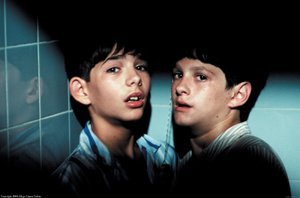Bad Education

|
Continuing what seems to be a common theme in his work, Pedro Almodóvar’s interest in the forbidden and the subversive is what sets his vision apart from that of other directors. The idea of humanising unconventional forms of desire and love, whether they border on obsession or sheer erotic fulfilment, underpins his creations and is epitomised in Bad Education.
The film centres on a script entitled ‘The Visit’, drafted by an aspiring actor going by the stage name ‘Ángel’ (Bernal). Almodóvar weaves together an excellent yet dizzying blend of fictions within fictions, plots within plots, and films within films. His mastery of Hitchcockian storytelling gives the film its structure, in addition to the block-type title sequences, the discreet voyeurism that overcomes paedophilic priest Padre Manolo (Homar), and the blurring of fiction, fantasy and reality.
A modern day film noir, Bad Education addresses the lives of two males who, as schoolboys, fell in love with one another at their Catholic boarding school, yet were separated by the jealous and erotic desire of Padre Manolo. Jumping back and forth between the present day (set in the 1980s) and the innocent, blossoming love of the past, the film focuses upon the homoeroticism that shaped both men’s identities when they are older, contrasting a homosexual, struggling film director, with a narcissistic, transvestite drug addict.
Containing a self-confessed autobiographical element, Almodóvar toys with the concept of identity, personified by Gael Garcia Bernal’s chameleonic portrayal of three separate characters, including the film’s only female protagonist, Zahara, a transsexual femme fatale.
A wonderfully crafted and sensual film, a dark, vindictive nature underlies the multiple narratives. Driven by obsessive and arguably corrosive impulsions, it is for good reason that the film’s sinister ending is brought to a close by the word ‘pasión’.
Nikita Shah
Archive
La Mala Educación (Bad Education) follows the story of a young actor (Bernal), who turns up at the offices of a fashionable director, Enrique Goded (Martínez), claiming to be Ignacio, his old school friend at a Catholic boarding school. Enrique is at first baffled by this sudden appearance, but is soon thrilled to see him and agrees to read the unpublished short story he has written, with a possible view to making it into a film.
It turns out that the short story is a fictionalised account of their time as two 11 year-old boys, who fell in love with each other and how it was destroyed by an abusive priest, Fr Manolo (Cacho), who was himself obsessed with the beautiful young Enrique; Ignacio is expelled and in the story grows up to be a drag queen and drug addict who finally turns up at the school for a terrible reckoning with their tormentor. The mystery deepens further still when the real priest turns up at Enrique's production offices, and offers to reveal the truth about the young actor claiming to be Enrique's boyhood love.
As the story unfolds ambiguously on screen, the viewer is faced with a dilemma - is this a flashback? Is it how Enrique sees it in his mind's eye? Or is it, in fact, footage from the movie Enrique is one day to make? And this is the genius of Almodóvar, who has put together a wonderful winding noir melodrama with complex layers of contradiction and uncertainty; the story is completely absorbing, and moves between playfulness and sensuousness with ease.
This film is full of great performances; Bernal is particularly outstanding and totally convincing as the nervous and desperate actor. Martinez is perfect as Goded, the director who becomes embroiled in this emotional tale, whilst Cacho plays Fr Manolo with a comedic twist.
Although not as powerful as his most recent film, Hable Con Ella (Talk to Her), nor as extravagantly emotional as Todo Sobre Mi Madre (All About My Mother), La Mala Educación does follow in their same successful footsteps and is a film not to be missed!
Alex Coe
More Information | Back to Previous Schedule | This Season | BBFC Classification Guidelines
Screenings of this film:
| 2004/2005 Autumn Term – (35mm) |
| 2010/2011 Autumn Term – (35mm) |


